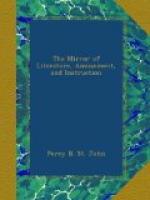“It however so happened, that I had occasion to go to Uxbridge, and I determined to try if my horse retained his dislike to the yard of the Crown Inn. I accordingly rode up the street until I came opposite to the inn-yard of the Crown. I faced about,” said the sergeant, “seated myself firmly in my stirrups,” at the same time exhibiting the attitude in which the feat was to be performed. “Expecting a plunge from my horse, I stuck my spurs into his sides, and pushed him forward into the yard; but what was my surprise to find him enter the yard as quietly as a cow that had just gone in before him. But I was not long in doubt as to what appeared to be the cause of this change in his antipathies, by the landlord’s coming up to him and tapping him on the shoulder: ‘Ha, Jack!’ says he, ’I’m glad to see you again; I thought I had lost you.’ ‘What do you mean, Mr. Landlord?’ ‘Sir,’ says he, this horse was stolen from me about six months ago; and I have never seen him since.’ I did not much relish this piece of information,” rejoined the sergeant, “but I could not help laughing at the conceit of the horse-dealer, to prevent me from going to a place where his theft of the horse would be discovered: I wished I had attended to his caution, as the sale to me was not regular, and I was left to make the best terms I could with the landlord.” What they were he kept to himself.
Fielding was a contemporary member of the home-circuit, with Sergeant Bond and myself. In the performance of the duties of conviviality, over which the learned sergeant, as head of the circuit, presided, he found in Fielding a powerful auxiliary. He was the son of the author of Tom Jones, and inherited to a great degree the wit and talents of his father.
As a companion, Fielding was invariably pleasant and inimitably entertaining. His conversation abounded with anecdotes, of which he had an inexhaustible fund: his great stock was of Irish stories which he gave with great truth and humour.
I have repeatedly heard him say, that the lowest class of the Irish had more native humour than any other body of people in the same rank in life. He would then relate, in proof of it, the event of a bet which was made on the subject at one of the club-houses in St. James’s Street, which then was crowded with English and Irish chairmen, and which was to be decided by the reply of one of each country to the same question. It was, “If you were put naked on the top of St. Paul’s, what would you be like?” The English chairman was first called in, and the question




